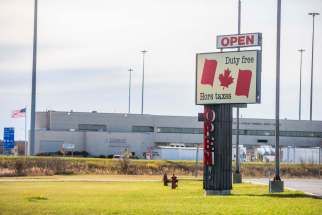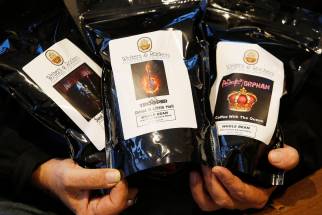COP26 failed, but individual choices still matter
Read this article for free:
or
Already have an account? Log in here »
To continue reading, please subscribe:
Monthly Digital Subscription
$19 $0 for the first 4 weeks*
- Enjoy unlimited reading on winnipegfreepress.com
- Read the E-Edition, our digital replica newspaper
- Access News Break, our award-winning app
- Play interactive puzzles
*No charge for four weeks then billed as $19 plus GST every four weeks. Offer only available to new and qualified returning subscribers. Cancel any time.
Read unlimited articles for free today:
or
Already have an account? Log in here »
Hey there, time traveller!
This article was published 18/11/2021 (1132 days ago), so information in it may no longer be current.
British Columbia’s Fraser Valley is underwater, sections of essential highway have been swept away and Vancouver — as well as Canada’s largest port — is, for the time being, cut off from the rest of the country. This once-in-a-century flood is happening months after a West Coast summer punctuated by deadly heat and devastating forest fires.
This once-in-a-century flood is also happening days after world leaders signed an agreement to do the bare minimum to address the climate crisis that is fuelling these kinds of extreme weather events.

The annual Conference of the Parties — this year’s iteration was known as COP26 — wrapped up last week with a flurry of lackluster commitments which, even if met, won’t keep global warming under the necessary 1.5 C threshold.
There were some wins, including the United States’ return to the table after years of climate denialism under former president Donald Trump, and the widespread recognition that fossil fuel usage needs to be phased out — although, wording in the final document was softened to deter only “unabated” coal use and “inefficient” fossil-fuel subsidies.
The loss column is, unfortunately, much starker. Despite the parties agreeing to return next year with more aggressive emission targets, the timelines are not sufficiently urgent. China, the world’s largest greenhouse-gas emitter, is allowing its emissions to rise for the next decade and aiming for net zero in 2060.
Developing nations were given little hope for a just future.
Based on the COP26 agreements, the world is on track to hit 2.4 C of warming.
Developing nations were given little hope for a just future. Even though these countries contribute the least emissions, they’re set to experience the worst outcomes from the climate crisis. Wealthier countries, including Canada, need to share their riches to help our neighbours adapt without undue human suffering.
So far, that hasn’t happened. The $100 billion “climate finance” fund aimed at doing just that remains $20 billion short.
Climate change doesn’t recognize borders. Our leaders need to start acting in the best interest of the planet instead of looking for loopholes to protect their own interests. Even with several small steps in the right direction, COP26 was, by and large, another disappointment.
Yes, incremental change should be celebrated. But it’s difficult to find optimism when once-in-a-lifetime weather events are happening every few months in our own backyard. So, where do we go from here?
Individuals will never be able to solve a problem so big and complicated without concerted government action and compliance from all economic sectors.
Humans have a hard time dealing with existential threats such as the climate crisis. After all, individuals will never be able to solve a problem so big and complicated without concerted government action and compliance from all economic sectors.
But that doesn’t mean individual choices don’t matter.
The vehicles we drive, the food we eat and the way we heat our homes add huge amounts of greenhouse gas to the atmosphere. Those with the resources to do so can purchase electric vehicles, reconsider their diets and reduce or eliminate meat intake, and retrofit their homes to be more energy efficient.
Based on uptake of the federal Greener Homes program — which has seen more than 120,000 homeowners register for the grants — there is a desire among Canadians to make changes. But more incentives and more accessibility are needed, especially for lower-income residents.
That’s why political engagement is more important than ever. We need to hold our leaders to account and demand more action on the climate crisis. We need to vote as if our grandkids’ lives depend on it — because they do.















